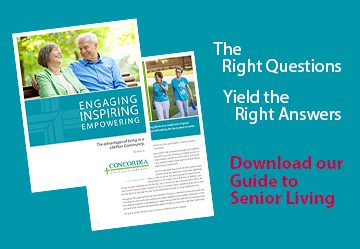
3 Key Components of Successful Aging
Aging is a privilege that we’re appreciating more and more as a society. Not only does aging bring experience and wisdom, but it also brings freedom. Retirement, supportive living communities that eliminate the burden of homeownership, and the personal finances to travel and enjoy your life are all a part of aging.
Successful aging helps make all of that possible, keeping you healthy and active. But successful aging is easier said than done. What is it, exactly, and how can you do it? This article will dive into successful aging, the research behind it, and how you can put it into practice in your own life.
What is Successful Aging?
Successful aging is the process of growing older while maintaining physical health, cognitive abilities, and strong social relationships.
Life expectancy has increased in part because middle age and older adults are taking better care of themselves which, along with advancements in medicine, has contributed to longer lives. But these changes alone don’t mean one will age successfully. Aging successfully is about more than just living longer, which is the general premise behind successful aging theories.
What Successful Aging is Not
There is no ‘one description fits all’ for successful aging. In the 1990’s, doctors Rowe and Kahn defined successful aging as “avoiding disease and disability, high cognitive and physical function, and engagement with life.” While this definition has become widely accepted, it is limiting. Eventually, due to physical aging and genealogy, some of us will not be able to meet these criteria at a certain age. Even without meeting these criteria, we can still age successfully.
While maintaining your health, eating a healthy diet, staying physically and/or mentally active, and remaining socially engaged are some things touted as supporting successful aging, it does not mean all factors will fit for you. Just like we are individuals with our own way of thinking and doing, successful aging follows the same path. It is an individual journey.
Why Is Successfully Aging Important?
Defining what successful aging looks like for ourselves is important because it helps us identify the activities, passions, people and places that we should focus on. Without thinking about what successfully aging means to us, we may never take the time to identify the parts of our lives that bring us greater meaning.
The following excerpt from Better with Age by Dr. Alan D. Castel also helps crystalize why successful aging is important:
“While successful aging may be one way to describe how well we age, the concept of “meaningful aging” maybe another important way to consider how to age well. Meaningful aging does not involve “winners or losers” in terms of longevity and health, but rather the need to focus on what is most meaningful to a person, especially in older age.”
Successful Aging Today
While there has been a significant amount of research into successful aging, the studies that review research from multiple sources give us the best insight. For example, one study reviewed 28 other studies to determine a definition of successful aging. It found that 14 components of successful aging were used across the research. But, aside from physical function and freedom from disability being in nearly every definition, no element was found in more than 50% of the studies.
What does that mean for you? It means that successful aging can be both defined and pursued in many different ways. However, there is a general understanding that successful aging includes three components:
Physical Health
You are free from or have a low risk of disease or disability
Mental Health:
You have relatively unimpaired cognitive functioning and acceptance of the aging process
Social Health:
You are active, engaged, social, and have a feeling of purpose in life
The Negative Mindset that Impacts Successful Aging
Many people view aging negatively. While that may seem normal, it isn’t healthy. In fact, this may even be a self-fulfilling prophecy. If you think about aging negatively, you’re more likely to pass away earlier.
The World Health Organization reports that life expectancy increases by 7.5 years when positive thinking about aging occurs. That means your mindset can significantly impact how well you age. And just because you don’t have all three key components of aging going for you doesn’t mean you can’t age successfully. Consider the following example, in which one element of successful aging was absent, but the rest prevailed:
Physicist Stephen Hawking was bound to a wheelchair with Lou Gehrig’s disease, but his mental and social health were unaffected, and he led an extremely successful life.
Stephen Hawking didn’t let one problem affect his mindset and he was able to live and age successfully. His disease did not stop him from success in the other key areas, proving that perhaps the most critical component of successful aging is the one not listed: acceptance.
How to Age Successfully Based on the 3 Key Components
Adopting the right mindset is the first step in aging successfully, but you can also address the other three components in your daily life.
Physical Health
It’s not always possible to ensure that you’re free from disease or disability, especially as you get older. That’s normal and doesn’t have to derail your life. You can work within your abilities and take action to lower your risk or manage your symptoms so that you can enjoy a full life. Below are a few ways you can achieve this:
-
See a Doctor
When you are feeling ill and take advantage of preventative health measures, such as a yearly check-up, flu shot, and age-appropriate exams.
-
Stay Active
Exercise is essential for maintaining good health and can be incorporated into your lifestyle regardless of your physical abilities. Chair exercises, for example, are a great way for those with limited mobility to be active. Utilize your gym, a trainer, a physical therapist, or a friend to help.
-
Make Healthy Food Choices
Proper nutrition plays a huge role in successful aging. Try meal planning, meal service, or speaking to a nutritionist for help making the right choices. The meals in supportive living communities are designed to be healthy, so take advantage of dining services if you’re already enjoying community life.
-
Get Enough Sleep
At least 7-8 hours a night is recommended and can reduce your risk for several health issues.
-
Don’t Ignore Chronic Pain
Chronic pain can contribute to a decrease in physical activity. Taking medications, getting physical therapy or doing an activity such as yoga are all possible solutions.
Mental Well-Being
Your mental health is closely connected to both your physical health and your social life. How you view your situation, the aging process, and life overall can have a significant impact on you. Studies have shown that adults continue to grow new brain cells throughout life, not lose them with age, as previously thought. This means that it is possible to delay cognitive decline. Consider these tips for keeping your mind in tip-top shape:
-
Take on a Challenge
Anything that promotes mental stimulation, such as reading, puzzles, problem-solving games, and learning a new hobby are all ways to exercise the brain.
-
Work Part-Time or Volunteer
This will keep the mind engaged with the outside world as well as utilize your skillset. A study at Duke University found that work (defined as any useful activity) satisfaction was one of the best predictors of longevity.
-
Invest in a Memory-Training App
This will keep you connected to technology, which is ever-changing and helps the brain continue to adapt, as well as sharpen your memory. There are many on the market you can choose from, including Lumosity, Brain Fitness Pro, and Clockwork Brain.
-
Engage in Spiritual Activities
Your spirituality is a major part of who you are as a person. Stay active in your faith-based community or pursue your own traditions to stay connected with your beliefs.
-
Stay Positive
A positive outlook on life and aging is a crucial factor in mental health and successful aging because it allows for happiness despite any negative factors you’re experiencing. If you are having trouble with this area, consider seeing a counselor, as depression and other mental health issues are serious issues.
Strong Social Relationships
Connecting with others is perhaps the area that older adults themselves list as the most fundamental component of successful aging. This area includes relationships with friends, family, and caregivers, as well as involvement in activities within the community. A recent study concluded that engaged individuals experienced a 70% lower rate of cognitive decline than those that are less focused or active in their relationships. Here are a few ways you can stay socially engaged:
-
Maintain Old Friendships & Make New Ones
It is important to keep in touch with your friends as well as continue to make new friends. Share your experiences with friends you’ve known for years or discover new similarities between neighbors in your community.
-
Travel When You Can
Traveling expands the mind, engages the body, and allows you to enjoy time with many different people. Cruises are a great option, as are programs that help adults travel even if they are physically limited.
-
Laughter
Laughter Laughter works as a natural feel-good medicine for your entire body. Watch a funny movie, see a comedian or enjoy stories with a friend.
-
Consider Social Media
This is a great way to connect with old friends, stay up to date on the latest with family, and feel connected even when you can’t physically be with relatives or friends.
-
Take a Class or Join a Group
Getting involved in group-based activities will allow you to share experiences with others and expand your own horizons as you learn a new skill.
-
Enjoy Your Grandchildren
Studies have shown that spending time with them can help you live longer. It’s also one of the more enjoyable activities for many adults.
How to Know if You’re Successfully Aging
No two people are the same, so everyone will experience successful aging in their own way. Your idea of successfully aging may not match the researchers’ definition. One area might not mean as much to you as the next and you may put higher regard on one component over the other. Ultimately, how you feel and the way you live will be what determines whether you age successfully.
One way you can help determine if you’ve found a good definition for yourself is by doing some research into the topic. Explore successfully aging to come up with a definition that works just for you.
Below are some resources to help you with your research:
- Successful Aging – by John Wallis Rowe M.D. and Robert L. Kahn – published in 1998.
- Aging Well – by George E. Vaillant M.D.- published in 2002.
- Winning Strategies for Successful Aging – by Eric Pfeiffer M.D. – published in 2013.
- Better with Age: The Psychology of Successful Aging – by Alan D. Castel PhD – published in 2018.
- Successful Aging: A Neuroscientist Explores the Power and Potential of Our Lives – by Daniel J. Levitin – published in 2020.
- Growing Old: Notes on Aging with Something Like Grace – by Elizabeth Marshall Thomson – published in 2020.
- Ageless: The New Science of Getting Older Without Getting Old – by Andrew Steele – published in 2020.
- Growing Young: How Friendship, Optimism, and Kindness Can Help You Live to be 100 – by Marta Zaraska – published in 2020.
How Senior Living Supports Successful Aging
Aging successfully can be more difficult if you’re focused on things other than yourself and the people close to you, things like constantly maintaining a home or finding new ways to connect with your community and neighbors. Many times, it’s easier to focus on things you love and holistic wellness when you live in a community that takes care of maintenance and creates a vibrant, connected environment for you.
Communities are the perfect place to ensure that you experience each of the key components of successful aging. They have help on hand for the physical aspects of your health, as well as planned activities to help keep you engaged socially and stimulated mentally. Living in a community has many benefits, but the biggest one may be that it can help you achieve the goal of aging successfully.
Supportive Living Community in Oklahoma City
When you’re looking for a supportive living community in Oklahoma City, consider Concordia. We provide multiple living options, from independent living to memory care, with an overall goal of helping every resident spend more time enjoying their life and pursuing their interests. For more information on our community, contact our team. We’re here to answer your questions and help you find the right way to age successfully within your lifestyle.
Health & Aging


